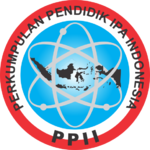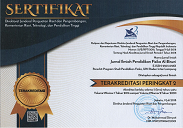Inquiry-Scaffolding Learning Model: Its Effect on Critical Thinking Skills and Conceptual Understanding
Abstract
This study aimed to examine the effect of inquiry-scaffolding on critical thinking skills and conceptual understanding. The research design used was a mixed-method embedded experimental model. The samples were 64 students. Two-way ANOVA test results for critical thinking skills and conceptual understanding are the same, where the significance value of the learning model = 0.00 (smaller than the alpha value of 0.05). It means that there are differences in critical thinking skills and conceptual understanding of students who learn by inquiry-scaffolding models ( IS) with conventional models. The interaction value between the learning model and the initial ability to critical thinking skills (CTS) is 0.502, while the conceptual understanding is 0.788. It means that there is no interaction between the learning model and the initial ability to CTS, or conceptual understanding. The results of advanced tests with the Tukey test prove that CTS and the conceptual understanding of students with high ability who experience learning with IS are higher than students with high ability in conventional learning. The same thing also applies to students with low initial ability. Thus, it was concluded that the learning model with an inquiry-based scaffolding technique was superior in improving CTS and conceptual understanding, on students with high and low initial abilities. Therefore, this technique can be used in other learning by using different moderator variables
Keywords
Full Text:
PDFReferences
Acar, O. A., & Tuncdogan, A. (2018). Using the inquiry-based learning approach to enhance student innovativeness: a conceptual model. Teaching in Higher Education, 0(0), 1–15. https://doi.org/10.1080/13562517.2018.1516636.
Andrews-Larson, C., McCrackin, S., & Kasper, V. (2019). The next time around: scaffolding and shifts in argumentation in initial and subsequent implementations of inquiry-oriented instructional materials. Journal of Mathematical Behavior, (July 2018), 100719. https://doi.org/10.1016/j.jmathb.2019.100719.
Batlolona, J. R., Baskar, C., Kurnaz, M. A., & Leasa, M. (2018). The improvement of problem-solving skills and physics concept mastery on temperature and heat topic. Jurnal Pendidikan IPA Indonesia, 7(3), 273–279. https://doi.org/10.15294/jpii.v7i3.12432.
Brownfield, K., & Wilkinson, I. A. G. (2018). Examining the impact of scaffolding on literacy learning: A critical examination of research and guidelines to advance the inquiry. International Journal of Educational Research, 90(October 2017), 177–190. https://doi.org/10.1016/j.ijer.2018.01.004.
Changwong, K., Sukkamart, A., & Sisan, B. (2018). Critical thinking skill development: Analysis of a new learning management model for Thai high schools. Journal of International Studies, 11(2), 37–48. https://doi.org/10.14254/2071-8330.2018/11-2/3.
Das, A. K., Nguyen, Q. T., Nguyen, A. T., Nomikoudis, M., & Van, D. H. (2019). Course redesign to incorporate flipped delivery: A business degree case in Vietnam. Issues in Educational Research, 29(2), 363–383.
Dawkins, H., Hedgeland, H., & Jordan, S. (2017). Impact of scaffolding and question structure on the gender gap. Physical Review Physics Education Research, 13(2). https://doi.org/10.1103/PhysRevPhysEducRes.13.020117.
Diani, R., Yuberti, & Syarlisjiswan, M. R. (2018). Web-enhanced course based on problem-based learning (PBL): development of interactive learning media for basic physics II. Jurnal Ilmiah Pendidikan Fisika 'AlBiruni, 7(April), 107. https://doi.org/10.24042/jipfalbiruni. v7i1.2849
Doleck, T., Bazelais, P., Lemay, D. J., Saxena, A., & Basnet, R. B. (2017). Algorithmic thinking, cooperativity, creativity, critical thinking, and problem solving: exploring the relationship between computational thinking skills and academic performance. Journal of Computers in Education, 4(4), 355–369. https://doi.org/10.1007/s40692-017-0090-9.
Dwyer, C. P., Hogan, M. J., Harney, O. M., & Kavanagh, C. (2017). Facilitating a student-educator conceptual model of dispositions towards critical thinking through interactive management. Educational Technology Research and Development, 65(1), 47–73. https://doi.org/10.1007/s11423-016-9460-7.
El Soufi, N., & See, B. H. (2019). Does explicit teaching of critical thinking improve critical thinking skills of English language learners in higher education? A critical review of causal evidence. Studies in Educational Evaluation, 60(August 2018), 140–162. https://doi.org/10.1016/j.stueduc.2018.12.006.
Fernandez, F. B. (2017). Action research in the physics classroom: the impact of authentic, inquiry based learning or instruction on the learning of thermal physics. Asia-Pacific Science Education, 3(1). https://doi.org/10.1186/s41029-017-0014-z.
Haruehansawasin, S., & Kiattikomol, P. (2017). Scaffolding in problem-based learning for low- achieving learners. The Journal of Educational Research, 0(0), 1–8. https://doi.org/10.1080/00220671.2017.1287045.
Hsu, Y. S., Lai, T. L., & Hsu, W. H. (2015). A Design Model of Distributed Scaffolding for Inquiry-Based Learning. Research in Science Education, 45(2), 241–273. https://doi.org/10.1007/s11165-014-9421-2.
Irwan, I., Maridi, M., & Dwiastuti, S. (2019). Developing guided inquiry-based ecosystem module to improve students’ critical thinking skills. Jurnal Pendidikan Biologi Indonesia, 5(1), 51–60. https://doi.org/10.22219/jpbi.v5i1.7287.
Kadir, M. S., Yeung, A. S., & Diallo, T. M. O. (2017). Simultaneous testing of four decades of academic self-concept models. Contemporary Educational Psychology, 51, 429–446. https://doi.org/10.1016/j.cedpsych.2017.09.008.
Klein, P., Viiri, J., & Kuhn, J. (2019). Visual cues improve students’ understanding of divergence and curl: Evidence from eye movements during reading and problem solving. Physical Review Physics Education Research, 15(1), 10126. https://doi.org/10.1103/PhysRevPhysEducRes.15.010126.
Kola, M. (2019). Grade 9 Technology Teachers’ Explication of Critical Thinking and its Enactment in the Classroom. African Journal of Research in Mathematics, Science and Technology Education, 0(0), 1–12. https://doi.org/10.1080/18117295.2019.1601457.
Kruit, P. M., Oostdam, R. J., van den Berg, E., & Schuitema, J. A. (2018). Assessing students’ ability in performing scientific inquiry: instruments for measuring science skills in primary education. Research in Science and Technological Education, 36(4), 413–439. https://doi.org/10.1080/02635143.2017.1421530.
Latifah, S., Irwandani, I., Saregar, A., Diani, R., Fiani, O., Widayanti, W., & Deta, U. A. (2019). How the Predict-Observe-Explain (POE) learning strategy remediates students’ misconception on Temperature and Heat materials ? In Seminar Nasional Fisika (SNF) 2018 (1–6). IOP Conf. Series: Journal of Physics: Conf. Series 1171. https://doi.org/10.1088/1742-6596/1171/1/012051
Leasa, M., Talakua, M., & Batlolona, J. R. (2016). The development of a thematic module based on Numbered Heads Together (NHT) cooperative learning model for elementary students in Ambon, Moluccas-Indonesia. New Educational Review, 46(4). https://doi.org/10.15804/tner.2016.46.4.15.
Mahanal, S., Zubaidah, S., Sumiati, I. D., Sari, T. M., & Ismirawati, N. (2019). RICOSRE: A learning model to develop critical thinking skills for students with different academic abilities. International Journal of Instruction, 12(2), 417–434. https://doi.org/10.29333/iji.2019.12227a.
Mercuri, S., & Mercuri, N. (2019). Scaffolding English Language Learners’ Literacy Development Through a Science Inquiry Approach. 231–245. https://doi.org/10.1007/978-3-030-02245-7_15.
Muhlisin, A., Susilo, H., Amin, M., & Rohman, F. (2016). Improving critical thinking skills of college students through RMS model for learning basic concepts in science. Asia-Pacific Forum on Science Learning and Teaching, 17(1).
Parappilly, M., Schmidt, L., & Ritter, S. De. (2015). Ready to learn physics: A team-based learning model for first year university. European Journal of Physics, 36(5). https://doi.org/10.1088/0143-0807/36/5/055052.
Park, M., Tiwari, A., & Neumann, J. W. (2019). Emotional scaffolding in early childhood education. 5698(May). https://doi.org/10.1080/03055698.2019.1620692.
Roksa, J., Trolian, T. L., Pascarella, E. T., Kilgo, C. A., Blaich, C., & Wise, K. S. (2017). Racial Inequality in Critical Thinking Skills: The Role of Academic and Diversity Experiences. Research in Higher Education, 58(2), 119–140. https://doi.org/10.1007/s11162-016-9423-1.
Ruchiwit, M., Patchotasingh, M., & Phanphairoj, K. (2019). Strategies for Creating Innovators in Thailand’s Higher Education. Journal of Medical Education and Curricular Development, 6, 238212051986307. https://doi.org/10.1177/2382120519863078.
Serway, R. A., & Jewett, J. W. (2004). Physics for scientists and engineers. Belmont, CA: Thomson-Brooks/Cole.
Shishigu, A., Hailu, A., & Anibo, Z. (2018). Problem-based learning and conceptual understanding of college female students in physics. Eurasia Journal of Mathematics, Science and Technology Education, 14(1), 145–154. https://doi.org/10.12973/ejmste/78035.
Suárez, Á., Specht, M., Prinsen, F., Kalz, M., & Ternier, S. (2018). A review of the types of mobile activities in mobile inquiry-based learning. Computers and Education, 118, 38–55. https://doi.org/10.1016/j.compedu.2017.11.004.
Tiruneh, D. T., Weldeslassie, A. G., Kassa, A., Tefera, Z., De Cock, M., & Elen, J. (2016). Systematic design of a learning environment for domain-specific and domain-general critical thinking skills. Educational Technology Research and Development, 64(3), 481–505. https://doi.org/10.1007/s11423-015-9417-2.
Tseng, S. S. (2019). Using Concept Mapping Activities to Enhance Students’ Critical Thinking Skills at a High School in Taiwan. Asia-Pacific Education Researcher. https://doi.org/10.1007/s40299-019-00474-0.
Whiley, D., Witt, B., Colvin, R. M., Sapiains Arrue, R., & Kotir, J. (2017). Enhancing critical thinking skills in first year environmental management students: a tale of curriculum design, application and reflection. Journal of Geography in Higher Education, 41(2), 166–181. https://doi.org/10.1080/03098265.2017.1290590.
DOI: http://dx.doi.org/10.24042/jipfalbiruni.v8i2.4214
Refbacks
- There are currently no refbacks.

Jurnal ilmiah pendidikan fisika Al-Biruni is licensed under a Creative Commons Attribution-ShareAlike 4.0 International License.
![]()








